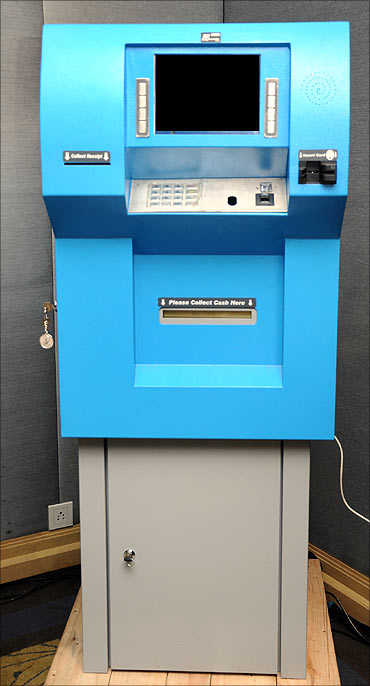
A newly installed low-cost ATM (automated teller machine) in Wai, Satara district in Maharashtra spews money anytime, even during a power cut, an incredible achievement in rural India, thanks to the pioneering initiative by a Chennai-based company Vortex Engineering founded by L Kannan.
A mechanical engineer from IIT Madras, Kannan decided against studying further or taking up a job to work for the rural poor.
For the last two decades, he has been working with non-governmental organisations in carrying out various developmental initiatives to create wealth and empower the poor.
on one of India's greatest initiatives to extend banking services to several parts of rural India...
You can send an e-mail to Kannan at info@vortexindia.co.in
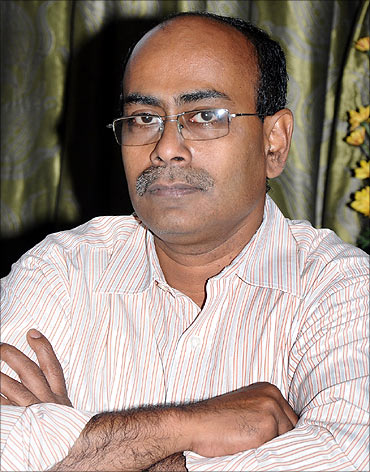
The low-cost ATM, Gramateller, developed in association with IIT Madras, been the company's biggest gift to rural India. This ATM consumes less power, functions during power cuts with a back-up power supply, and has the option of running on solar power.
While some villagers were scared to use the ATM for the first time others said, "Baap re... ab machine se bhi paise nikalta hai!" (Now, money comes out even from machines!).
...
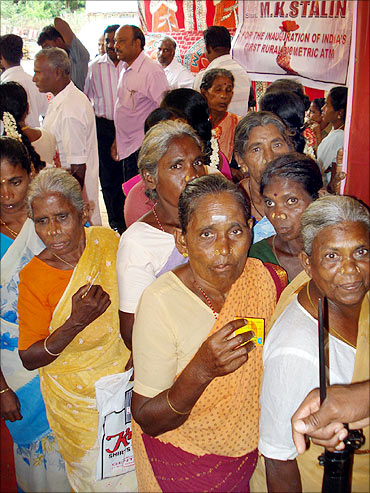
Kannan now dreams of setting up an ATM in every Indian village, which means about 650,000 ATMs. His dream does not seem far-fetched considering the company's outstanding achievements so far.
The company has already installed 200 ATMs across various locations in India and a few have been installed abroad as well.
...

All the villages where the machine has been installed (or planned to be installed) typically face power cuts of 4 hours to 12 hours daily.
There has also been a case where, in a village in West Bengal, conventional ATMs could not be installed because they needed 3 phase power (ATM and AC to be installed in different phases) and the village had only a single phase connection.
A Vortex ATM has hence been installed there which needs only a single phase power supply on a normal 5 amp socket.
...

"European countries, the United States and Japan have at least one ATM per thousand persons. By that reckoning, India needs a million ATMs. We don't even have 5 per cent of that number," says 42-year-old Kannan.
India has an ATM penetration of about 0.04 per 1,000 people in India, giving company an opportunity to usher in a low-cost ATM revolution in India.
...
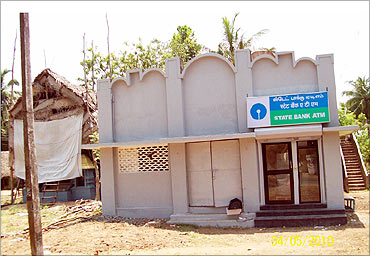
The World Economic Forum in its latest list of Technology Pioneers, comprising 31 of the most innovative technology start-ups from around the world, names Vortex Engineering. It is the only company from India in the list.
L Kannan shares the trials and tribulations of being at the forefront of rural India's biggest economic successes.
...
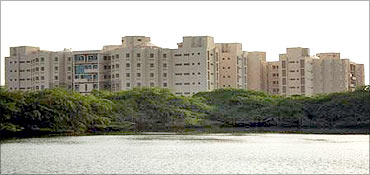
What was your ambition when you joined the IIT? How has the IIT helped you in becoming an entrepreneur?
I don't think I had any particular 'ambition' then. It was the in-thing to join IIT and so I did it too. Frankly, engineering is served up at colleges in arbitrarily fragmented morsels and you end up all muddled if you try to find a thread that connects it all.
So what IIT did was to make me resolve not to seek a job as an engineer! It also made me decide that if I have to make sense of the world and make it a better place, it is entirely in my hands; I can't expect formal institutions to make the job easier for me.
That meant no further academic pursuits either. So after this there was no option left for me but to become an entrepreneur,
However, that happened many years later. In that journey, I was fortunate to be associated with Prof. Jhunjhunwala and his associates at IIT Madras. The rural-ATM is the outcome of that association.
What does the name vortex signify?
Vortex belongs to a class of natural phenomena known in physics as 'singularities'. These are instances where conventional laws break down, infinite concentrations of energy are possible and unexpected outcomes are certain to happen. I thought these traits describe our organizational impact very well.
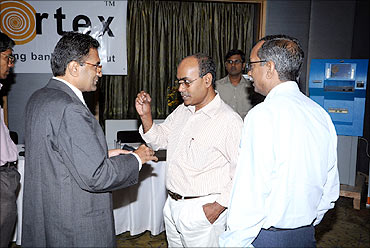
How has your experience been working on projects in rural areas?
I have certainly enjoyed it. The important challenge is that you should not make some facile generalisations based on experiences from elsewhere.You have to constantly question your assumptions and keep your feet firmly on the ground.
What was the motivation to work towards empowering the rural people?I don't think I have ever sacrificed anything. I am too self-centered to do that. I have always chosen to do what seems to be the most meaningful pursuit to devote myself to -- irrespective of whether it is fashionable or respectable.
Making an intervention that impacts rural people seemed like an interesting challenge to take on.
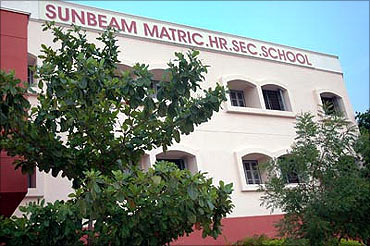
I can't claim authorship of everything! But I have been associated with a number of initiatives and contributed in a way that is satisfying to me.
After I completed my engineering, my friend suggested that we start a school at Vellore. We built the school from scratch and it is today one of the most successful schools in the area. While many children from elite backgrounds study there, about 20 per cent of the students are from very poor background and are given free education.
Around 1993, I got associated with PPST Foundation, an organisation that explores the socio-political and cultural dynamics of science and technology. This gave me the opportunity to interact with a number of people in the development sector and understand different perspectives that inform debate in the sector.
This was also the time I started seriously looking at the artisan sector as a means of creating wealth in rural India.
All this led me to apply myself to filling an important technology gap in the textile value-chain. This is where I actually started to learn engineering.
...
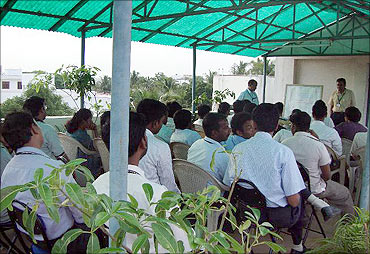
My involvement with artisan industries taught me that cost of finance is an important determinant of success.
Unfortunately, if you need Rs 100 crore (Rs 1 billion), you can get it at 4 per cent per year with a 20 year payback; but if you need Rs 10,000, you would pay 4 per cent per month. No wonder small economic activities are seldom 'competitive'!
The reasons for such differential costs can be flattened by technology, and the rural ATM is the customer-face of this change.
We started in early 2005 as a small team. It took about three years with various hoops of product design before our first live deployment in 2008.
...

We are about half as expensive, in terms of upfront cost. The operating costs, which matter more on a per-transaction basis, are even lower.
Vortex has developed a very elegant and innovative cash dispensing mechanism that does not use any conveyor belt and the cassette is mounted vertically and in the top half of the ATM.
This makes the notes dispensed from cassette to travel only a short distance to the cash presenter in ATM. So, it uses much smaller and low-power consuming motors and hence able to operate with less power.
Vortex ATM also uses lower-power consuming processors and LCD displays that consume much less power and Linux as OS.
When did you first launch this ATM? How was the response? How many villages have Vortex's ATMs?
Our first deployment was for disbursals to people under National Rural Employment Guarantee Act (NREGA). People were delighted by the transparency and accessibility of the system.
As a result, they soon stopped withdrawing all the money that was due to them -- preferring instead to save it in the account. They started the habit of saving, and the bank found that that they had an unexpected surplus of deposits.
This was reported on the web site of the Union Ministry of Rural Development.
...

Challenges never end, otherwise the world would be a dull place. But the biggest meta-challenge is to have the team that is capable of taking on those challenges. Fortunately, we have passed that stage.
How much have you invested in the business?
This is a venture capital funded business in which about Rs 30 crore (Rs 300 million) has been invested.
Has any other bank other than SBI approached you? Are you looking at serving the international market as well?
Several banks have approached us. We are expecting the action to hot up in the next few months. We are not focussing on the international market right now, but we have a few deployments in Saudi Arabia, South East Asia and Africa.
...
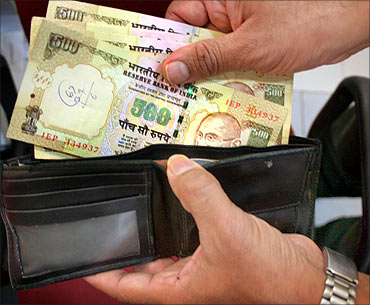
I have no doubt that you need one ATM in every village. All economic activities in a village involve exchanges with distant markets.
Further, there is a huge remittance economy -- pensioners receiving pensions every month, people employed in cities or abroad remitting money back home, etc.
The cost of sending money through conventional means is about 5 per cent -- availability of ATMs would directly add this amount into the rural economy.
Has Vortex started making profits? What are your revenue expectations in future as you expand operations?
We have not yet broken even, but we are on the way. Our growth plans are aggressive, but I would rather let the results speak than speculate in advance.
...
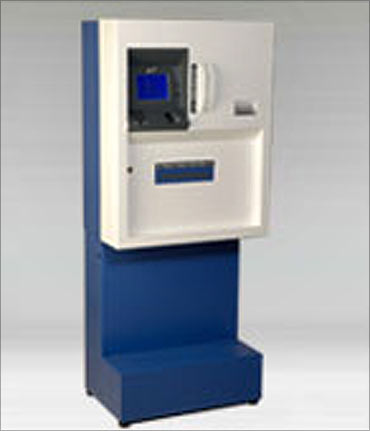
A week ago, I met an old acquaintance. He thanked me profusely for bailing him out when he was stranded with no money in a remote village at night.
It turned out that he had hired a taxi to the place and found he was running short of Rs 800 to pay the cabbie. A passer-by then directed him to an ATM in the next village. He was surprised that there should be an ATM at such a location; and then discovered it was a Vortex installation.
It was very gratifying.
...

I have always gone about my work as a passionate hobbyist would, for the sheer delight intrinsic to the work. The moment I stop enjoying doing something, I consider I am not fit to do it anymore and pass it on to others more competent.
One should never be possessive about one's pursuits. The more inclusive we are, the more certain is our success.
What are your future plans?
There are many things I wish to do, but I don't really plan them out. But whenever I set my heart strongly on doing something, an opportune moment happens almost magically. As they say, 'luck favours the prepared mind'.